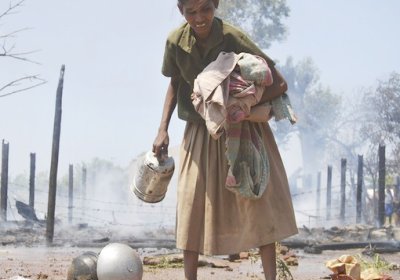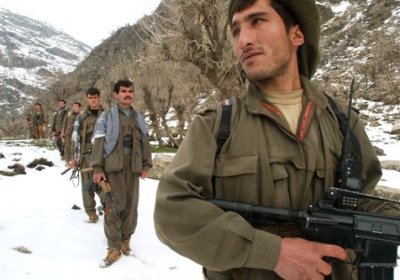On April 9, the Australian Labor Party government, then led by Kevin Rudd, imposed a three-month suspension of the processing of refugees from Sri Lanka. On July 6, the Labor government of PM Julia Gillard announced, in the context of unveiling its pre-election tougher stance against refugees, that the suspension would not be extended.
National liberation
Step by Step: Women of East Timor, Stories of Resistance and Survival
Edited by Jude Conway
Charles Darwin University Press, 2010
241 pages, $44
Review by Niko Leka
The title of Step by Step refers to how the Timorese gained their independence. The steps are told through the firsthand narratives of 13 women who grew up in East Timor.
When they were born it was a Portuguese colony, which in 1975 was invaded and occupied by Indonesia. It achieved victory in the quarter century-long struggle for independence in 1999.
Hundreds of activists in Washington, DC demonstrated on July 6 outside the White House to protest against Israeli Prime Minister Benjamin Netanyahu’s visit.
Protesters held signs calling on the US government to end military aid to Israel as Netanhayu met US President Barack Obama.
After the meeting, Obama said: “I think the Israeli government, working through layers of various governmental entities and jurisdictions, has shown restraint over the last several months that I think has been conducive to the prospects of us getting into direct talks.”
Leichhardt Friends of Hebron can be very proud of the Festival of Friendship for Hebron it held over June 25-26.
The event raised more than $5000 for a kindergarten in the impoverished village of Um al Khair in the South Hebron hills. It also won a significant political victory over the ban the previous Leichhardt Council administration placed on a Palestinian photo exhibition two years earlier.
The following statement was released on June 27 by the group Palestinian Queers for BDS (boycott, divestment and sanctions – an international campaign to isolate Israel in protest against its treatment of Palestinians). Support for the BDS campaign has grown significantly since Israel’s massacre of peace activists on a boat taking aid to Gaza on May 31.
* * *
Palestinian Queers for BDS call upon all queer groups, organisations and individuals around the world to boycott the apartheid state of Israel.
On June 1, the Kurdish Workers Party (PKK) announced an end to its 13-month unilateral ceasefire. Since 1984, the PKK has waged an armed struggle against the Turkish state for Kurdish self-determination.
A day earlier, imprisoned PKK leader Abdullah Ocalan announced that he was withdrawing from negotiations. He cited a disconnect between the Turkish government’s promised reforms and continued violent repression of Turkey’s Kurdish population.
The statement below was released by Asian left groups on June 25. To add your organisation’s name, email international@socialist-alliance.org.
* * *
Israel stands increasingly isolated after its manufactured confrontation on May 31, 2010, with the peace flotilla, in which nine Turkish activists on the Mavi Marmara were murdered. So now is the time to increase the pressure on Israel to lift the siege of Gaza.
Seven oxygen machines donated to the Palestinian Authority by a Norwegian development agency were seized by Israeli officials, Ma’an news agency said on June 25. The Ramallah-based PA health ministry said the machines were en route to hospitals in Gaza and the West Bank.
The ministry said in a June 24 statement that Israeli officials confiscated the machines, claiming the generators attached “came under the category of possible use for non-medical purposes” if they were delivered to Gaza.
More than a year after its victory over the pro-independence Liberation Tigers of Tamil Eelam (LTTE), the Sri Lankan Army (SLA) continues to hold large areas of land in the predominantly Tamil north and east of Sri Lanka as “high security zones” (HSZ).
Many of the Tamil inhabitants who were evicted from these areas to create the HSZs during the decades-long war are still unable to return to their homes.
Indonesian military forces have stepped up their campaign of repression in West Papua in recent months. But leaders of the Free Papua Movement (OPM) continue to defy Indonesian demands to surrender.
The campaign for West Papuan independence has been amplified by the continuing repression and lack of improvement of living standards under the current “special autonomy” system.
An eyewitness report from West Papua Media Announcements (WPMA) posted on Pacific.scoop.co.nz on June 16 described a large military mobilisation in the mountainous Puncak Jaya region in central West Papua.
United Nations Secretary-General Ban Ki-moon announced on June 22 the formation of a three-member panel to advise him on whether Sri Lanka committed crimes during the last months of its war against the Liberation Tigers of Tamil Eelam, Reuters said that day.
On June 15, something amazing happened: British Prime Minister David Cameron apologised for the British army shooting Irish people.
“It was wrong”, said Cameron, after a government inquiry found the British army was responsible for the killing of 14 unarmed civil rights demonstrators, seven of them teenagers, in the 1972 Bloody Sunday massacre in Derry.
On January 30, 1972, up to 30,000 people marched in Derry, in the six Irish counties occupied by Britain, to demand an end to internment, a policy that allowed for the jailing of people without trial.
- Previous page
- Page 130
- Next page






